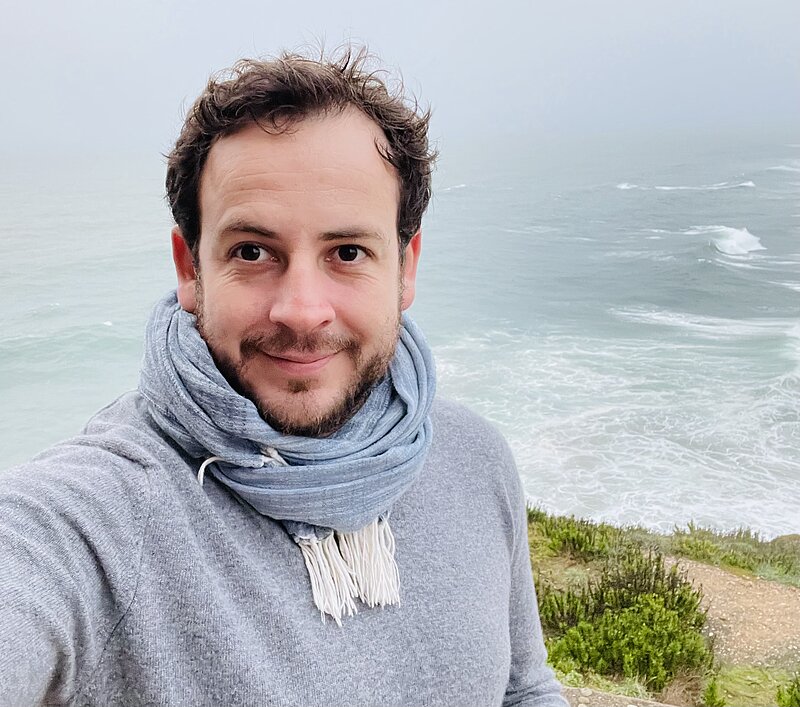Dr. Elias Barriga started a new research group for Physical Measurements and Manipulations of Living Systems in the Cluster of Excellence Physics of Life (PoL), Dresden, Germany, in September 2023. His group will explore how the collective cell behavior responds to biophysical stimuli, especially to bioelectrical signals; and how they influence tissue dynamics and morphogenesis. Every cell operates independently, like cell migration, and cell differentiation, however as a collective, new functions emerge. These new functions are crucial for life, for instance, embryo development and tissue repair. The collective behavior of cells also describes the spread of diseases, such as cancer metastasis. Thus, their research has the potential to provide insights that others can eventually use to design new therapies.
The concept of collective behavior can be understood from the point of view of a society. Every human being can function independently of others; however, when clustered together they act as a collective and form a new entity, a society. Similarly, each cell of our body functions independently of each other, and when grouped, performs functions that give rise to a living body. However, what guides such collective behaviors is not clearly known, and one hypothesis is that physical signals may trigger the emergence of collective properties.
The team led by Dr. Barriga has previously shown that a physical feature, the stiffness/rigidity of a tissue, is a key parameter for triggering the collective behavior of cell migration. Additionally, they characterized sensors for stiffness and described their role in modulating the onset of collective migration in vivo (inside living tissues).
Similarly to mechanical signals, endogenous electrical signals—generated within and by the embryo—can potentially influence collective cell behaviors. Hence, exploring how bioelectrical signals emerge to influence embryo development is one of the main goals of the new research group in PoL. ‘We aim to understand how morphogenetic events such as collective migration, differentiation, and eventually collective cell death occur in a synchronized manner within tissues that undergo morphogenesis in development, regeneration, and cancer.’ says Dr. Barriga.
To this end, they will develop methodologies to measure and modify the electrical stimuli, and quantitatively describe the contribution of these biophysical stimuli in collective cell behaviors. Being at PoL, they will take advantage of the unique environment the campus offers, with a wide range of interdisciplinary expertise and high-end technologies.
His findings will contribute to the current knowledge by developing new methods and techniques that could be used in the future for the study of other biological contexts. "We are delighted and pleased that Dr. Barriga decided to join PoL. His expertise is a great addition to PoL and it will support in unraveling the physical principles of life”, says Prof. Dr. Campàs, the manager director of PoL.
Dr. Barriga has a B. Sc. in Biology from the Universidad Austral de Chile and a Ph.D. in Molecular Biosciences from Universidad Andrés Bello in Chile. After that, he conducted postdoctoral research through EMBO-LTF and Marie Skłodowska-Curie fellowships at the University College London. After initially establishing his group at the Instituto Gulbenkian de Ciência in Portugal in 2019, he was selected as a La Caixa fellow, awarded an EMBO Installation Grant and the prestigious ERC Starting Grant; more recently Dr Barriga was selected for the EMBO Young Investigator Programme.
About the Cluster of Excellence Physics of Life
Physics of Life (PoL) is one of three clusters of excellence at TU Dresden. It focuses on identifying the physical laws underlying the organization of life in molecules, cells, and tissues. In the cluster, scientists from physics, biology, and computer science investigate how active matter in cells and tissues organizes itself into given structures and gives rise to life. PoL is funded by the DFG within the framework of the Excellence Strategy. It is a cooperation between scientists of the TU Dresden and research institutions of the DRESDEN-concept network, such as the Max Planck Institute for Molecular Cell Biology and Genetics (MPI-CBG), the Max Planck Institute for the Physics of Complex Systems (MPI-PKS), the Leibniz Institute of Polymer Research (IPF) and the Helmholtz-Zentrum Dresden-Rossendorf (HZDR).
physics-of-life.tu-dresden.de
Contact:
Dr. Kaori Nakashima
Science Communication Officer
Cluster of Excellence Physics of Life
Tel.: +49 351 463-41517
pr.pol@tu-dresden.de
